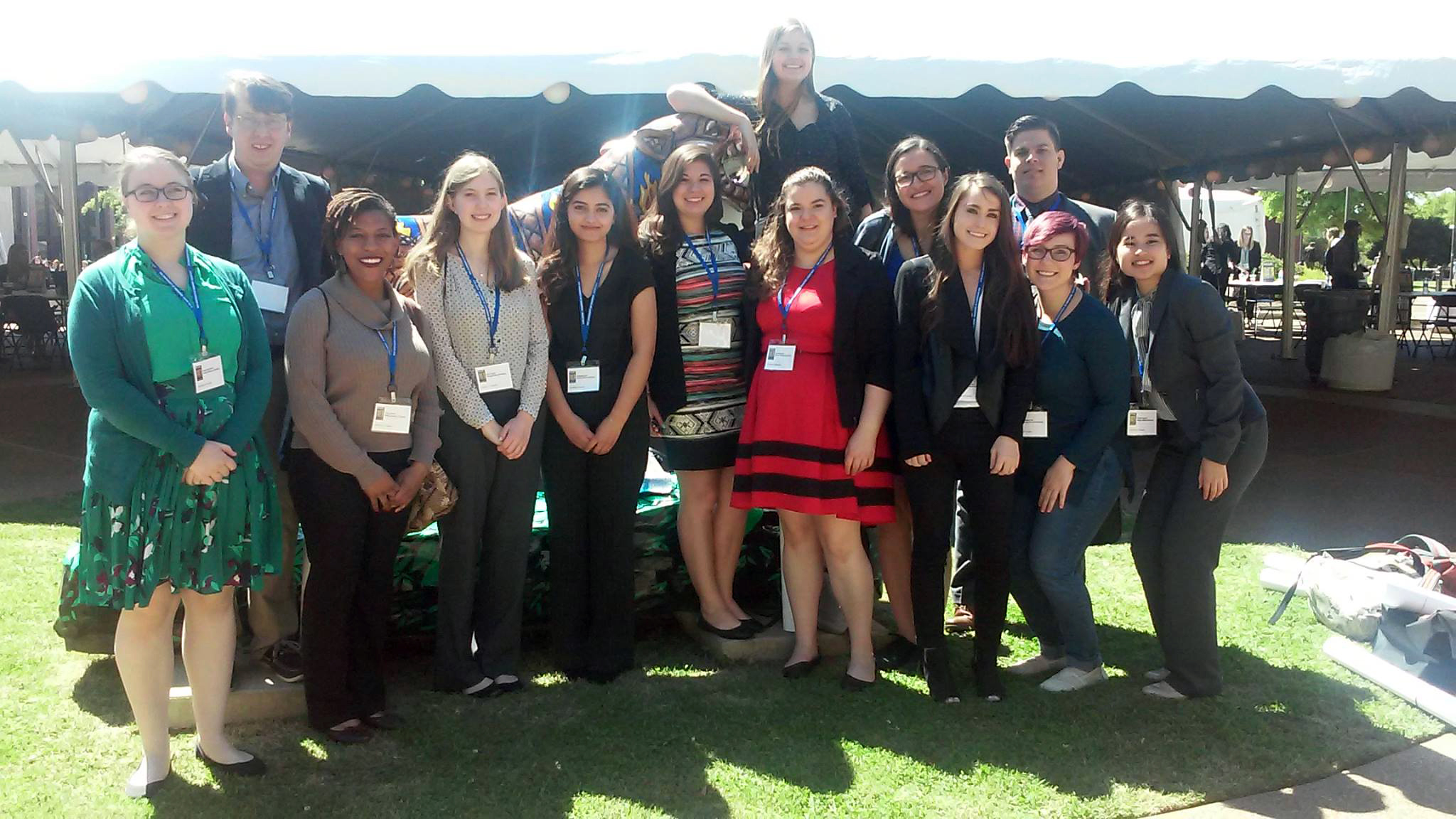The annual National Conference on Undergraduate Research is one of the biggest undergraduate research events of the year, attracting more than 3,000 students from universities across the country. A group of 45 Mason students attended the 31st annual conference, held April 6-8 in Memphis, Tenn.
The Office of Student Scholarship, Creative Activities and Research, known as OSCAR, paid the way for Mason’s attendees. They traveled 16 hours each way by bus and stayed
four-to-a-ro om at a local hotel. Representing every school at Mason and an array of academic fields, the students gained valuable experience at presenting their research and answering questions about it. Here, we invite you to meet a few of Mason’s star undergraduate researchers.
om at a local hotel. Representing every school at Mason and an array of academic fields, the students gained valuable experience at presenting their research and answering questions about it. Here, we invite you to meet a few of Mason’s star undergraduate researchers.
When Jasmine Dang and her family moved to Northern Virginia from their native Vietnam, she was 13 years old and spoke little English. It took determination and concentration to learn a new language while starting the seventh grade.
Dang’s participation in undergraduate research continues that learning experience.
“Especially with all the writing,” the senior psychology major said, “I had to get out of my comfort zone a little bit.”
Dang’s research is about vigilance and why some people fail at sustaining their attention. That is important, Dang said, because of real-world jobs that require intense concentration, such as being an air traffic controller. Even driving a car takes vigilance.
“It’s a very big field because it applies to a lot of our daily tasks,” she said. “To know more about vigilance and attention, we might be able to help improve training or develop tasks to prescreen individuals who are good at sustaining their attention.”
How do you test if someone is good at vigilance? One way is to measure cognitive flexibility—that is, one’s ability to be mentally flexible to maintain attention.
Dang’s research participants first completed a puzzle task while following multiple rules. In another test, participants were shown a series of numbers and told to press a key for every number that flashed before them, except the number 3.
As it turned out, the tests did not show a positive correlation between cognitive flexibility and vigilance. That means more research is needed to identify other predictors of vigilant performance, Dang said.
“I still learned a lot,” she said of her research, which was funded by a $1,000 OSCAR grant.
While researching George Mason, the man, Desmond Moffitt believed it best to focus on the gray areas.
Yes, Mason was a slave owner. But he also authored Virginia’s Declaration of Rights that began by saying “all men are by nature equally free and independent.” That document provided much of the language for the Declaration of Independence and Bill of Rights.
“Mason was complex,” said Moffitt, a senior European history major and member of the Honors College. “His economic ventures were sustained by his slaves, but there seems to be a level of trust and agreement between slave and owner.” For example, Moffitt said, while Mason did not free his slaves upon his death, some lived in what were called Log Town houses that were some distance from Mason’s mansion, Gunston Hall, and provided a level of privacy and privilege.
“This is by no means an apology for George Mason,” Moffitt said. “He took advantage of the power that was invested in the plantation economy. Yes, he had the option to release his slaves, but if the slaves are the livelihood of my family, then I’m going to put my family first.”
So is there a judgment to be made about Mason?
“We shouldn’t mix up today’s judgments with what happened then. That’s where we have to caution ourselves,” Moffitt said. “I can’t make a statement about whether he was good, bad or moral. Those things change. His comments were in the right place but his actions were not.”
“He was,” Moffitt concluded, “a product of his time.”
When Lynn Bonomo was in high school, she recycled and wanted to learn about climate change and marine biology.
“It evolved into, I just want to save the ecosystem and the environment,” she said.
As a senior biology major, Bonomo is now trying to determine the environmental factors contributing to the spread of Nosema, the fungal gut pathogen taking a toll on Northern Virginia’s bumblebees.
It’s a difficult endeavor, said Mason associate professor of biology Rebecca Forkner, who is mentoring the research, for which Bonomo received a $1,000 OSCAR grant. “I could brag about her all day,” Forkner said. “She’s my most reliable student. She excels in fieldwork, and she never misses a beat as far as her coursework.”
From last spring into September, Bonomo was out once or twice a week collecting hundreds of worker bees from five common bumblebee species. Most alarming was the lack of yellow and rusty-patched bumblebees that had previously been present.
“Either we didn’t manage to get to the sites when they were out or they are in decline enough from Nosema and other problems,” Bonomo said. “It’s really concerning.”
With so many factors that could contribute to the spread of Nosema and the declining bee populations, answers might not be fast in coming.
“If you understand why they are declining you have a chance to fix it,” Bonomo said. “The whole problem with conservation is finding out why.”
April 7, 2017 / by Damian Cristodero
Adapted from: https://www2.gmu.edu/news/392921


